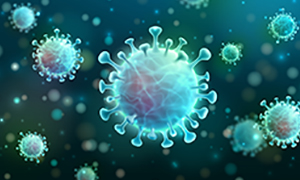Treating SARS-CoV-2
Monoclonal Antibodies as an Opportunity for COVID-19 Therapeutics
COVID-19 remains classified as an endemic disease, even with widespread vaccination, according to Aron Hall, deputy director for science at the CDC's Coronavirus and Other Respiratory Viruses Division. While no longer a pandemic-level concern, COVID-19 is here to stay, continuing to pose a global health challenge. And while vaccines are commonplace, effective therapeutic options remain limited, leaving a significant market need for targeted monoclonal antibody (mAb) treatments.

At Emory University, a team of researchers led by Jens Wrammert, PhD, an associate professor in the Department of Pediatrics and Division of Infectious Disease, has been at the forefront of addressing these challenges. His team's expertise in antibody-mediated immunity was pivotal in developing solutions during the pandemic.
Yet, before their COVID-related work, Wrammert’s team had spent years isolating monoclonal antibodies from human B cells, allowing them to deeply analyze the body’s response to infections. Monoclonal antibodies are lab-engineered molecules designed to mimic the immune system’s ability to fight harmful pathogens like viruses and bacteria. Unlike natural antibodies, which are produced as a diverse mix by the immune system, monoclonal antibodies are highly specific—targeting a single, carefully selected viral protein to neutralize infection.
These antibodies have been widely used in treating infectious diseases, autoimmune disorders, and cancers. For viral infections like Ebola, RSV, and influenza, monoclonal antibodies have provided life-saving treatment options by blocking viral entry into cells and enhancing immune clearance.
Mounting a Rapid Pandemic Response
At the onset of the pandemic, Wrammert’s team quickly recognized the importance of their research in addressing COVID-related challenges. Their first breakthrough came in antibody testing, leveraging their expertise in monoclonals to rapidly produce the spike protein needed for serological tests.

Jens Wrammert, PhD
"Because of our experience with making antigens and monoclonals, we could very quickly make that [spike] protein," Wrammert explained. This allowed the team to serve as a lifeline for testing across the Emory Health network, supplying clinical labs with reagents for antibody testing before commercial tests were widely available.
"We supplied the clinical labs here at Emory with reagents to perform this testing, which they used extensively, prior to it becoming commercially available," Wrammert recalled. The team's early efforts placed them at the forefront of COVID-related health innovations.
Building on these diagnostic advancements, the team expanded their work to therapeutic interventions. They isolated SARS-CoV-2 neutralizing monoclonal antibodies, aiming to develop targeted treatments for infected patients. These antibodies bind to the virus’s spike protein, preventing it from infecting healthy cells—offering a critical breakthrough in COVID-19 treatment.
Filling the Gap in COVID-19 Treatment
While vaccines have been instrumental in reducing the severity and spread of COVID-19, they are not equally effective for everyone. Millions of immunocompromised individuals—such as transplant recipients, chemotherapy patients, and those with autoimmune diseases—struggle to mount a strong immune response, even after vaccination.
For these high-risk patients, monoclonal antibodies serve as both a preventive shield and a targeted treatment, offering protection when the body’s own immune defenses fall short.
"The groups of patients that don’t normally respond well to a vaccine are still at risk for severe COVID," Wrammert emphasized, highlighting the ongoing need for these therapies. More broadly, monoclonal antibodies serve as a crucial treatment option for anyone actively fighting COVID-19, even if they have been previously vaccinated.
Expanding Beyond COVID-19
Even as global health research shifts focus away from COVID-19, Dr. Wrammert’s team continues to adapt, applying their expertise to a broader range of public health challenges. Their current research explores flavivirus biology, including dengue and West Nile virus, pediatric influenza, and cholera vaccine development.
"We all kind of swiveled around when COVID started, and everybody was doing some aspect of research in that direction," Wrammert reflected. "But as the funding has changed, a lot of efforts are being directed back at what they were before."
Kaitlyn Taylor, the OTT licensing associate who works with Wrammert on this technology, echoed this thought.
“Dr. Wrammert’s work emphasizes why basic science is crucial to our society. His team had spent years studying monoclonal antibodies, and when COVID-19 came, they were able to focus their efforts on that. Now that COVID-19 has abated, they can continue their research to be ready for the next threat.”
Having demonstrated their ability to quickly pivot in response to a global crisis, Wrammert’s team is well-positioned to tackle the ever-evolving landscape of infectious disease treatment.
— Parker Wenig
Tech ID: 21003
Read the technology brief.